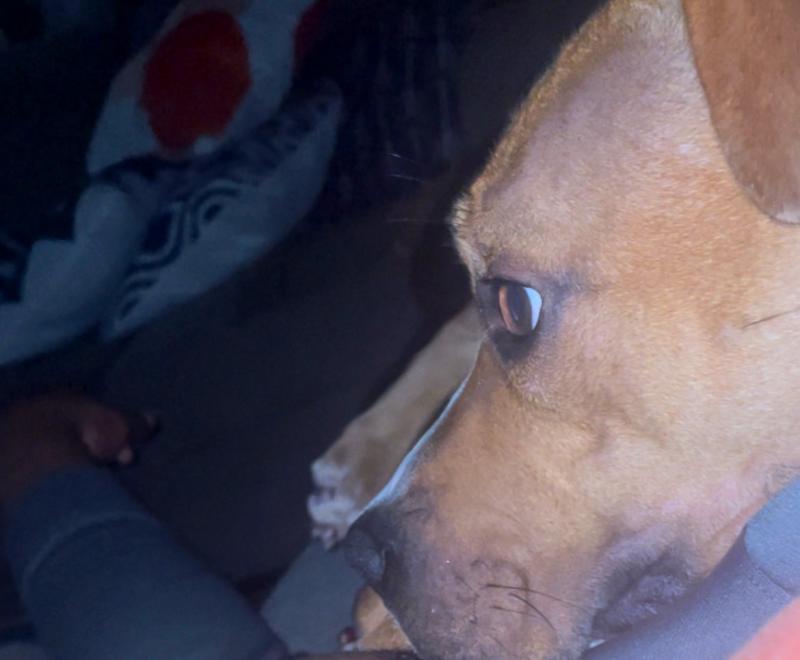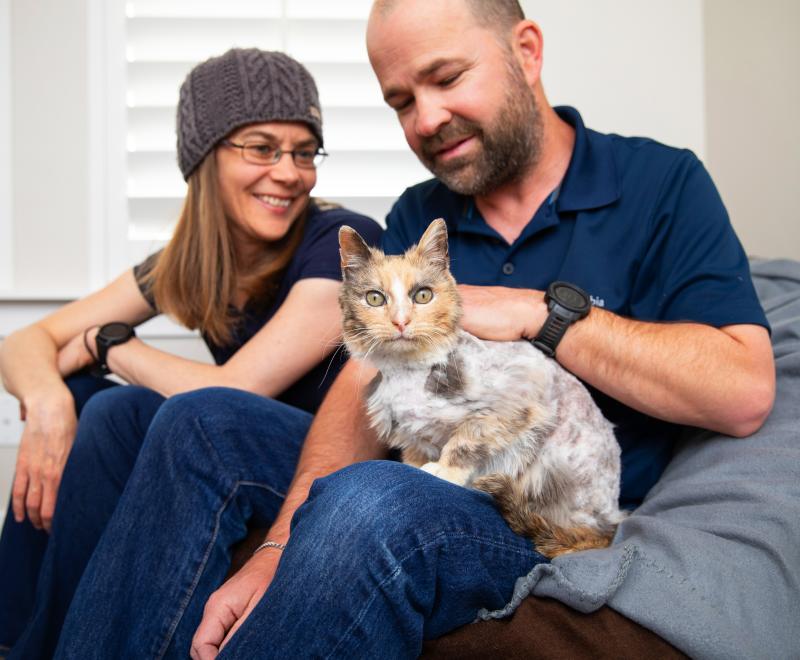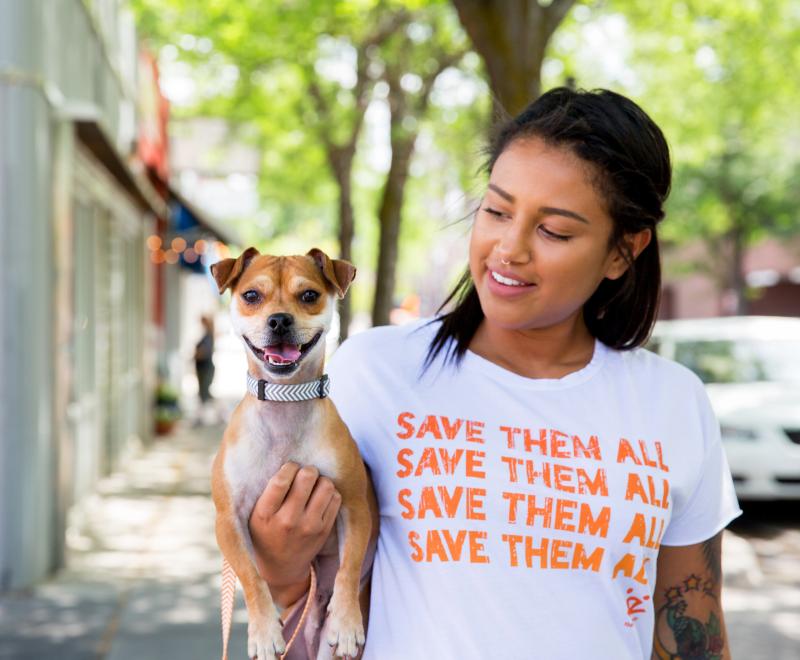Playgroups at Arkansas shelter let a shy dog shine

Taylor Hill knew she wanted to adopt a dog when she walked into the Pine Bluff (Arkansas) Animal Shelter last March. But what she didn’t know is that she would soon become a volunteer at the shelter, and it was through that experience that she met Kiba, a shy dog with an uncertain future.
A beautiful honey brown, short-haired dog with white patches on her chin and belly, Kiba had been at the shelter for eight months and wasn’t getting much attention from adopters. She appeared scared and standoffish. She cowered away from people who came near her kennel, and she would keep her distance from volunteers in the play yard.
According to Cathy Overfield, a Best Friends employee embedded with the staff at Pine Bluff (thanks in part to a grant made possible by Maddie’s Fund®): “She was a dog who was harder to adopt because she could not connect with people. Adopters are looking to make a connection right away, but she was unable to do that.”
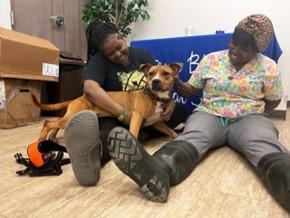
Dog playgroups to the rescue
Despite the obstacles, there were rays of hope. While Taylor was volunteering, she began to notice Kiba. And Cathy, working with the Pine Bluff staff, introduced playgroups, which give dogs a chance to be around each other to build social skills. It was in playgroups where shy Kiba showed her true self. “We discovered she was phenomenal with other dogs,” Cathy says. “Being around other dogs brought her out of her shell.”
With Taylor volunteering every couple of weeks, she was able to look at many dogs and even get them together with her dog Ruger to see whether a match was possible. But nothing clicked. The staff suggested Kiba as a possibility.
[Kansas animal shelter staff sees dogs in a new light]
“I had noticed her and knew she was the (longest-term) resident,” Taylor says. “But I was thinking about a puppy and was looking at other dogs. One day, I broke up some treats, and she came into my lap. She was so cute. I took her for a walk.
“The next day I brought my fiancé, Calieb, down to see her. He’s a big dude, and at first it seemed like she wanted to get away from him. But then he got down to her level, and she came up to him.”
Taylor and Calieb were smitten, and apparently so was Kiba. Suddenly, she had two humans in her life who didn’t scare her at all. And they were nice and patient with her. Things looked promising, but it wouldn’t be as simple as just signing the adoption papers.
One more obstacle
To get permission to bring a second dog into the family’s apartment complex, the dog would have to be certified as an emotional support animal, which would require putting her through some special training.
“I had been a bit hesitant about Kiba because she was skittish,” says Taylor. “But after spending time with her, I knew I could take her and turn it around. I wanted to make her feel better. I wanted her to know what it means to be loved on.”
Taylor spoke with Marcus Graydon, the Pine Bluff shelter director, and told him that they really wanted Kiba. They would get her the training to be an emotional support animal. (Ruger has been Taylor’s emotional support animal in the past.) “He (Marcus) was a huge help in getting us the paperwork, and he agreed to give us more time,” she says.
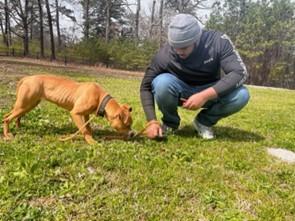
New life, new love
Kiba has started her training and is enjoying life at home with her new family. She and Ruger became buddies.
“They are my babies,” says Taylor. “They run in a big field together. They like tug-of-war. She’s more hyperactive than Ruger, but I love them both. She’s my princess, and he’s my prince.”
Kiba has made Taylor and Calieb’s residence her own. She usually sleeps in the hallway but sometimes heads for the second bedroom or the couch. She likes to sit on the balcony and gaze at the squirrels.
“She snores,” says Taylor with a laugh. “And Ruger will look up at her as if to say: ‘Really? Is that her?’ She does not like baths but loves to tear up new stuffed toys. I decided to get her something a little more difficult to rip up, so I got her one of those rubber tire toys. I walked away, and she tore it up in about five seconds.”
While the dogs are compatible, they are very different in temperament. When Taylor (a hospital ER registrar) and Calieb (a supervisor at a home improvement store) arrive home from work, Kiba jumps up excitedly to welcome them. “But Ruger,” says Taylor, “walks up, says ‘Hey, mama,’ and then walks off.”
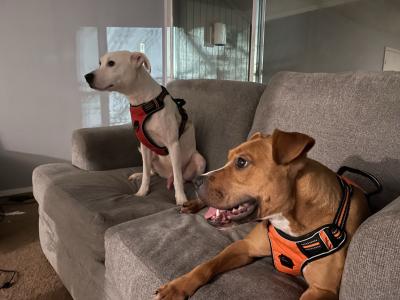
Never give up
The discovery of Kiba’s natural social skills in playgroups was a huge step forward because it brought her out of her shell. “It’s good to not give up on dogs who don’t connect with people right away,” says Cathy. “They just need more time to do it.”
The success of Kiba and other dogs in playgroups has resulted in Pine Bluff integrating dog-to-dog introductions as part of its program, with regular playgroup sessions on the schedule. The shelter also invites potential adopters looking to match a dog with a new family member to bring in their dogs for introductions.
The days of labeling a dog first thing based on kennel presence are a thing of the past at Pine Bluff. And it’s all because the staff put a long overlooked, misunderstood dog in the best position to shine. The result is more dogs getting more chances to show their best selves and to go on to new homes. And, oh yes: Kiba has a family to love her.
